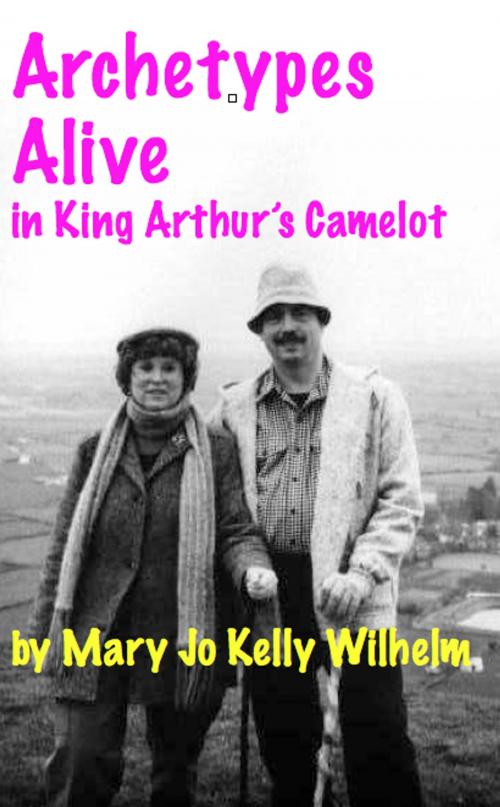Archetypes Alive in King Arthur's Camelot
Nonfiction, Travel, Europe, Great Britain, Science Fiction & Fantasy, Fantasy, Contemporary| Author: | Mary Jo Kelly Wilhelm | ISBN: | 9781458145475 |
| Publisher: | Mary Jo Kelly Wilhelm | Publication: | January 28, 2011 |
| Imprint: | Smashwords Edition | Language: | English |
| Author: | Mary Jo Kelly Wilhelm |
| ISBN: | 9781458145475 |
| Publisher: | Mary Jo Kelly Wilhelm |
| Publication: | January 28, 2011 |
| Imprint: | Smashwords Edition |
| Language: | English |
From the opening of the story:
The basis for this story was Storyfest Journey’s seventh journey to Camelot. Individuals quickly became archetypes. Myths supplanted history. Facts became fiction. Any resemblance to archetypes is intentional.
Prologue
Ordinarily, we would pick people up in Exeter at the Rougemont Hotel and drive by coach to Hatherleigh village where we stayed at The George Hotel. For a week Storyfest Journeys would explore Devon, Cornwall and Somerset, looking for the story of King Arthur and the Knights of the Round Table. Then, we would drive back to Exeter.
But this was our seventh year, and seven is a number of fullness and completion. We could not have returned so many times to the same places and stories without nudging the sleeping forces.
How shall I tell you what happened?
“Begin at the beginning and go to the end,” said Bob, my husband and The Storyteller.
The Story
Harry, our coach driver, a Devon man, drove into Exeter from Hatherleigh. Harry was tall and fair and looked like he had two small red apples placed on each cheekbone. Harry lived in the village of Winkleigh, his wife’s village. His wife was a cook for a boys school and she looked like a whole bushel of apples formed into a person. Lumpy, she was, and sweet, with a certain tartness.
Harry appreciated women. He would talk to me, giving me his full attention. But when I felt his attention had drifted, I had only to look around to see a shapely young woman nearby. His face would be smiling.
Harry pulled his Jonkheere coach in front of The Rougemont Hotel. He was a careful man, a measuring man, having been a carpenter on Dartmoor before becoming a coach driver.
How many have you this time?” he asked in his soft Devon voice.
“Thirteen,” I replied.
“A right number,” he said. “Be careful, then. And how many women?” he asked, offhandedly.
“Eleven,” I said.
“Oh, aye,” he said. I saw him smile to himself.
Exeter is a very old port city on the River Exe, which empties into the English Channel. The Romans had chased the Dumnonii tribe from this site in 46 AD. The Roman fort and barracks, the baths and the shops lay deep in the foundation of this very modern looking city. For Exeter was modern, having been rebuilt after extensive bombing by the Germans in the Last Great War.
There were many layers of history to be explored in Exeter, but we were too busy. Our Camelot group were scattered about The Rougemont Hotel in the center of the town on top of a hill. We had to gather them. We did not know then what forces were gathering for our Seventh Year in Camelot.
From the opening of the story:
The basis for this story was Storyfest Journey’s seventh journey to Camelot. Individuals quickly became archetypes. Myths supplanted history. Facts became fiction. Any resemblance to archetypes is intentional.
Prologue
Ordinarily, we would pick people up in Exeter at the Rougemont Hotel and drive by coach to Hatherleigh village where we stayed at The George Hotel. For a week Storyfest Journeys would explore Devon, Cornwall and Somerset, looking for the story of King Arthur and the Knights of the Round Table. Then, we would drive back to Exeter.
But this was our seventh year, and seven is a number of fullness and completion. We could not have returned so many times to the same places and stories without nudging the sleeping forces.
How shall I tell you what happened?
“Begin at the beginning and go to the end,” said Bob, my husband and The Storyteller.
The Story
Harry, our coach driver, a Devon man, drove into Exeter from Hatherleigh. Harry was tall and fair and looked like he had two small red apples placed on each cheekbone. Harry lived in the village of Winkleigh, his wife’s village. His wife was a cook for a boys school and she looked like a whole bushel of apples formed into a person. Lumpy, she was, and sweet, with a certain tartness.
Harry appreciated women. He would talk to me, giving me his full attention. But when I felt his attention had drifted, I had only to look around to see a shapely young woman nearby. His face would be smiling.
Harry pulled his Jonkheere coach in front of The Rougemont Hotel. He was a careful man, a measuring man, having been a carpenter on Dartmoor before becoming a coach driver.
How many have you this time?” he asked in his soft Devon voice.
“Thirteen,” I replied.
“A right number,” he said. “Be careful, then. And how many women?” he asked, offhandedly.
“Eleven,” I said.
“Oh, aye,” he said. I saw him smile to himself.
Exeter is a very old port city on the River Exe, which empties into the English Channel. The Romans had chased the Dumnonii tribe from this site in 46 AD. The Roman fort and barracks, the baths and the shops lay deep in the foundation of this very modern looking city. For Exeter was modern, having been rebuilt after extensive bombing by the Germans in the Last Great War.
There were many layers of history to be explored in Exeter, but we were too busy. Our Camelot group were scattered about The Rougemont Hotel in the center of the town on top of a hill. We had to gather them. We did not know then what forces were gathering for our Seventh Year in Camelot.















